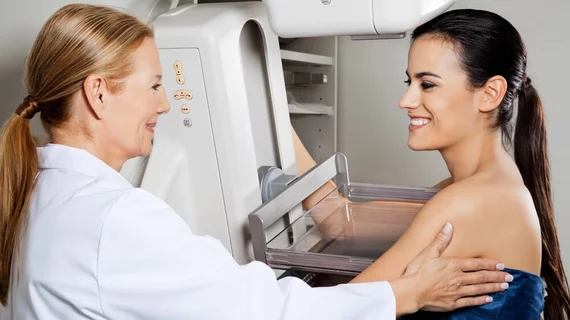Baseline mammography education necessary for optimal breast screening outcomes
Improving women’s understanding of baseline mammograms and their importance is necessary, according to new research published in the Journal of the American College of Radiology.
The researchers, led by Robert K. Horsley, MD, of the Mayo Clinic in Phoenix, said most women are unaware of the term "baseline mammogram." They are also unfamiliar with decreasing rates of false positive, which has led to decreases in costs, discomfort and additional testing,
Horsley and colleagues sought to evaluate women's knowledge and perception of baseline mammograms using a HIPAA-compliant questionnaire.
The survey included basic demographic information including age, race and education. Additionally, patients were asked about their screening frequency and knowledge of baseline mammograms, including perceptions about the importance of such tests.
The questionnaire, based on multispecialty provider input and literature review, was distributed among women who had no prior history of breast cancer. All patients who went for screening mammograms at Mayo Clinic in March and April 2017 were offered the questionnaire.
The study cohort included 401 women, with a 66 percent majority between the ages of 56 and 77. Approximately 87 percent of the cohort was white, and 93 percent had education beyond a high school degree. The researchers found:
- 77 percent of the cohort reported having yearly mammograms.
- 31 percent reported having a history of an abnormal mammogram.
- 45 percent had not heard the term “baseline mammogram.”
- 31 percent who knew the term “baseline mammogram,” heard it from their primary care provider, 9 percent from a radiologist or other specialist, and 4 percent from media/social media.
- 74 percent chose the correct definition of a baseline mammogram, while 24 percent of the cohort incorrectly thought a baseline mammogram was the same as a screening mammogram.
- 67 percent did not think a baseline mammogram was important for decreasing associated cost, time and discomfort due to the number of mammograms read as abnormal.
Baseline mammography knowledge gaps exist because it is not an often-used term and it has not been used in public health messaging regarding breast cancer screening, according to the authors.
“There is robust evidence that access to baseline mammography decreases false-positive mammography rates, thus decreasing overall costs, discomfort, and unnecessary additional testing and procedures to patients,” the authors wrote. “In a group of educated women, a high percentage were unfamiliar with the concept of a baseline mammogram, highlighting an opportunity for health care and public health providers to educate women on these breast cancer-screening principles.”

